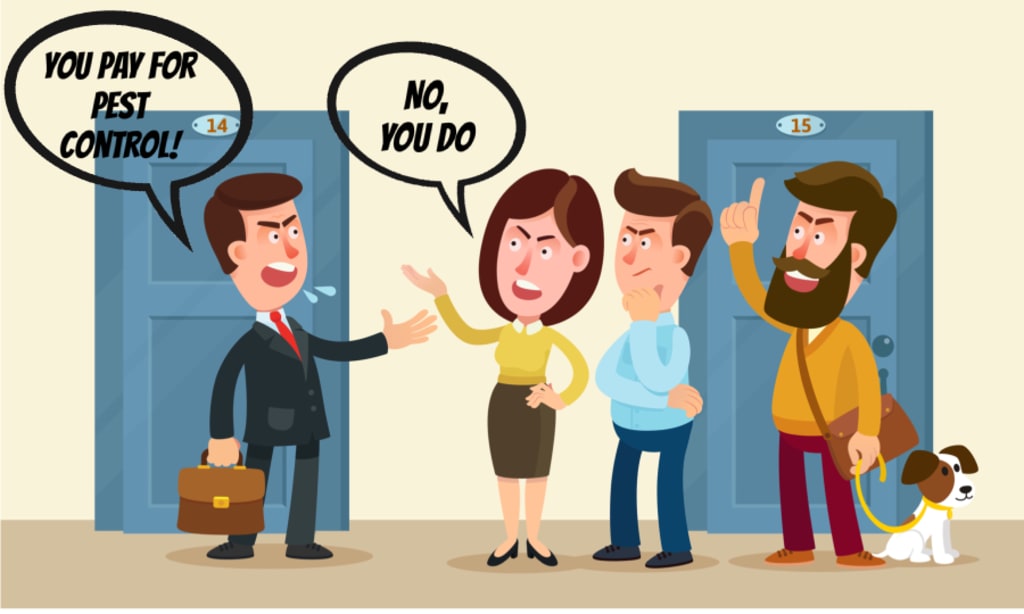
Who pays for Pest Control? This is a tough question to answer. According to the BC Residential Tenancy Policy Guidelines:
“The Landlord is responsible for ensuring that rental units and property, or manufactured home sites and parks, meet “health, safety and housing standards” established by law, and are reasonably suitable for occupation given the nature and location of the property.” AND “The landlord is generally responsible for major projects, such as tree cutting, pruning and insect control.”
"The tenant must maintain “reasonable health, cleanliness and sanitary standards” throughout the rental unit or site, and property or park.”
In general, landlords are responsible for pest control unless they can show the infestation is a result of tenant behavior. If this is so, the tenant becomes responsible.
So, if the tenant discovers rats, mice, cockroaches or other pests accessing their home due to disrepair of the property, then it should fall to the landlord to remedy the situation and treat the infestation. But if the tenant discover the same pests accessing their home due to their lifestyle and behavior choices, then they may have to foot the bill. Here’s what a tenant needs to do to avoid a pest invasion.
BED BUGS
Bed bugs deserve a category all by themselves.
You might be afraid to report bed bugs out of fear that you will be blamed for the problem. The safest course of action is to notify your landlord as soon as you discover evidence of an infestation. Once notified, your landlord should hire a professional pest management company to inspect and treat any affected units on the property. Neither you nor your landlord should attempt to treat an infestation on your own.
If your landlord does not hire a professional company, you can apply for dispute resolution through the Residential Tenancy Branch. You then request an order that they comply with the law and fix the problem. Alternatively, if you live in a city that has a Standards of Maintenance Bylaw, a Bylaw Officer might be willing to inspect your property. After the inspection they may issue warnings or fines to your landlord, or otherwise enforce the bylaw. Discovering bed bugs is not considered an acceptable reason to withhold rent or end your tenancy early.
STANDARDS OF MAINTENANCE BYLAWS
The following municipalities have Standards of Maintenance or Good Neighbour Bylaws that specifically reference “bed bugs”, “insects” or “pests”:
WHO IS RESPONSIBLE WHEN A BED BUG INFESTATION IS DISCOVERED IN A RENTAL UNIT?
A question asked by landlords and tenants alike. Who is responsible for the treatment of the unit if a bed bug infestation is discovered? The simple answer is that the landlord or property manager is responsible for the treatment of the unit. However, the tenant is responsible for cooperating with the landlord’s efforts to manage the bed bug infestation – such as prepping the unit for treatment, washing and bagging clothing etc.
THE BEST METHOD TO GET RID OF BED BUGS
- The pest management company your landlord hires should provide instructions on how to prepare for treatment. Normally people and pets are required to vacate for 4 – 5 hours and the unit must be ventilated upon re-entry. The pest management company should provide you with a preparation sheet to help you prepare your home prior to the treatment.
Here are a few things you must do to prepare your home for a bed bug treatment:
- Reduce as much clutter as possible
- Bag clothing and linens that are not being treated
- Move all furniture away from the walls
- Do not flip any furniture, particularly mattresses; and
- Vacuum all floor areas and dispose of the bag immediately in an outside garbage bin.
After treatment, any bagged clothing and linens that have not been treated should be laundered and put in the dryer on high heat for a minimum of 40 minutes. If an item cannot be laundered, place it in the dryer for 60 minutes on high heat. Do not put any of the laundered items back in their original bags.
PAYING FOR A BED BUG TREATMENT
While it can be somewhat difficult to prove that a tenant caused an infestation, it is more common for a tenant to be found responsible for creating an infestation. This can be caused by the tenant not reporting it in a timely manner or not cooperating during the treatment process.
IF YOU CAUSE THE BED BUG INFESTATION
Your landlord could have a valid argument for you to pay or at least contribute towards, the cost of treatment if:
- You cause an infestation to spread by unlawfully denying access to your unit or:
- Not following the pest management company’s recommendations.
GENERAL PEST CONTROL ADVICE TO TENANTS
- Keep the home clean and hygienic
- Don’t leave food or dirty dishes out overnight
- Take out the trash on a daily basis
- Don’t have excess clutter around the home
- Don’t leave out uneaten pet food in the dog or cat bowl
Remember: keeping your home clean and tidy will always minimalize your chances of a pest infestation.
ADVICE TO LANDLORDS
It is in your best interest to keep up with the repairs and maintenance of your property. So there is no misunderstanding, add a clause to the rental agreement stipulating who is responsible for pest control.






Comments
There are no comments for this story
Be the first to respond and start the conversation.